Thursday Feb 19, 2026
Thursday Feb 19, 2026
Saturday, 20 February 2016 00:10 - - {{hitsCtrl.values.hits}}
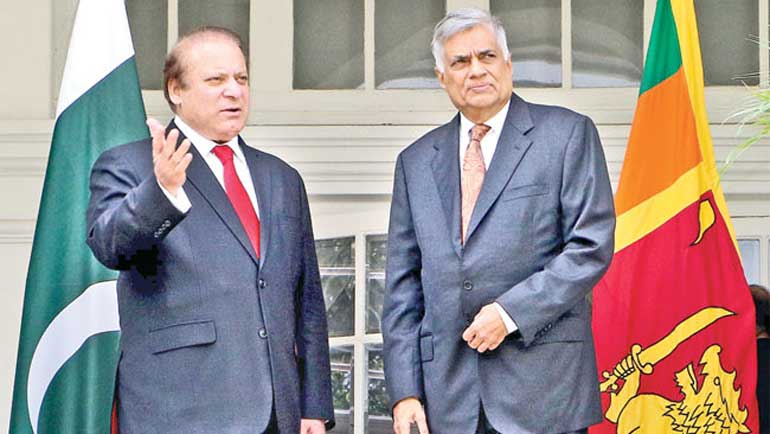
Pakistani Prime Minister Nawaz Sharif and Prime Minister Ranil Wickremesinghe
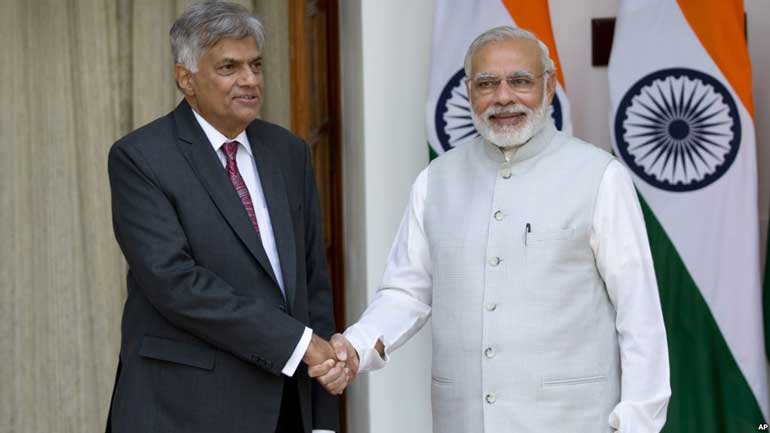
Prime Minister Ranil Wickremesinghe and Indian Prime Minister Narendra Modi
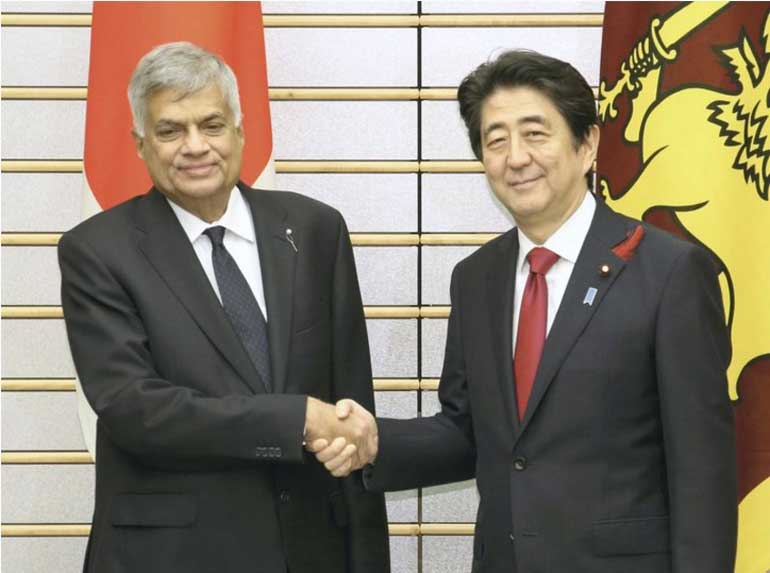
Prime Minister Ranil Wickremesinghe and Japanese Prime Minister Shinzo Abe
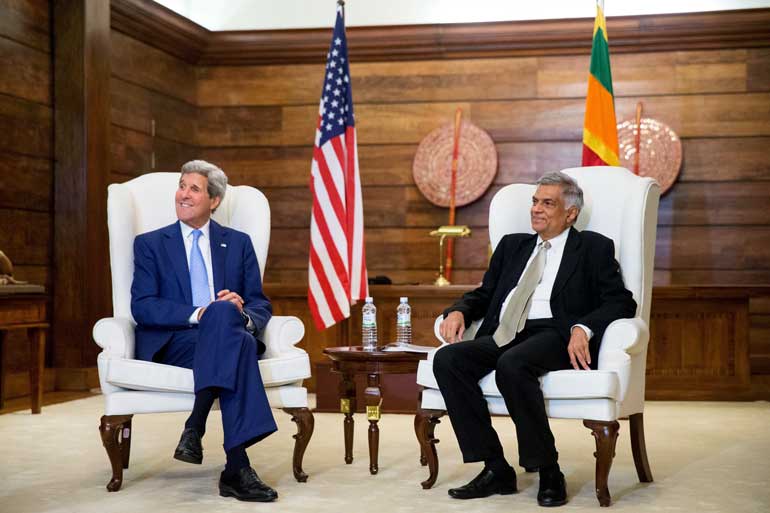
U.S. Secretary of State John Kerry and Prime Minister Ranil Wickremesinghe
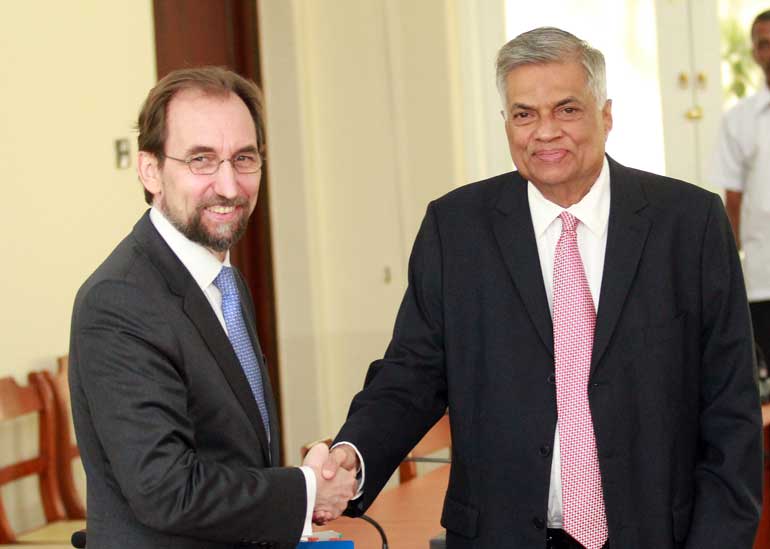
UN Human Rights Chief Zeid al Hussein and Prime Minister Ranil Wickremesinghe
 Both politics and diplomacy describe the interaction between groups. They both connote the existence of competing interests.
Both politics and diplomacy describe the interaction between groups. They both connote the existence of competing interests.
Politics refers to the interactions surrounding governance and decision-making in general. Whether it’s a country’s government, or international politics – politics describes the current state of relationships and how groups will behave in order to promote their interests. Importantly these interactions include everything from festivals to negotiations to elections to wars.
Politics and diplomacy
Diplomacy is the sub-set of politics dealing with peace. To discuss discreetly and prevent conflict is being diplomatic.” When nations begin wars or fighting erupts between groups within a country, “Diplomacy has failed.”
Almost any political action that deals with the prevention or cessation of physical violence can be considered diplomacy, but the precise definition is not always agreed upon, e.g., if a country kills successful terrorists within its own borders it may not be considered diplomacy, but if U.N. peacekeepers do so it may fall under that umbrella. It should be remembered, despite their stated purpose, not all of the activities of diplomats are considered “diplomacy”. A diplomat represents the political interests of their own country, regardless of whether those interests will lead to peace or war.
Diplomacy as an instrument of good governance
The functioning of diplomacy is influenced by a complicated combination of different interrelated factors. Diplomacy as an instrument of good governance should adjust itself to meet the new challenges, to become more relevant, open and agile, to modify its methods and to fully utilise opportunities offered by the technological revolution.
Each time a major transformation in the international system occurs, the role of diplomacy in world politics is revised. This issue was on the international agenda at the beginning of the twentieth century, and now, on the threshold of the new millennium, the debate reoccurs. The exchange of views among the participants will help to better understand what should be the purpose and the method of diplomacy in the age of global transformation.
One hundred years ago the question of the future of diplomacy was raised as a result of technological progress – the invention of the radio and telegraph and the intervention of public into the domain of foreign policy. The first factor brought the apprehension that diplomats would become “honorary mailmen” and the second raised the issue of open diplomacy. However, the role of diplomacy in the twentieth century has not been restricted by these two factors.
The functioning of diplomacy is influenced by a complicated combination of different interrelated factors and a brief analysis of their impact on the evolution of diplomacy would clarify the essence of the subject.
To begin with, there is a set of political factors. During most of the twentieth century, two world wars, the Cold War, the rivalry of two super powers, the ideologies of international affairs and military confrontation have made diplomacy a subsidiary instrument of power politics and ideology. As a result, diplomacy has very often executed the “dance of death.” The end of the Cold War has radically changed the international political scene. Moreover, today we are facing the shift of the civilisational paradigm, which affects not only the major units of world polities – the states – but which also brings new actors into the forefront of international relations.
The major political factor influencing diplomacy is the relative decline of the role of the national governments. Today governments are facing stern competition from other actors. Private sector, religious groups, immigrants, media and other entities of the civil society are demanding from the government that their interests be taken into consideration and that they have a say in making and 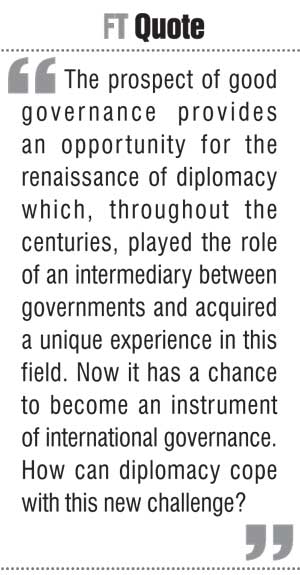 implementing foreign policy. People want to travel freely, to conduct business abroad or to be involved in various types of cultural exchange.
implementing foreign policy. People want to travel freely, to conduct business abroad or to be involved in various types of cultural exchange.
Perhaps the most active “intruders” into the modern diplomacy from outside are non-governmental organisations (NGOs). This is particularly well seen from the UN viewpoint. For example, in Geneva there are currently about 1,400 NGOs officially registered with the UN Office. All of them are international, and have branches in at least two or more countries. Although their status is different from that of the diplomats, in practice they often participate in the diplomatic process, in particular in the promotion and discussion of such issues as human rights and environmental protection. Nowadays, international decisions are more often shaped according to the opinions of the NGOs. Gradually they are expanding the sphere of their influence.
Curiously, not only NGOs but legislative branches of the states themselves are contributing to this diplomatic process. The parliamentarians of the world have successfully set up a structure of global and regional interaction and are now claiming a role in diplomatic meetings which was traditionally reserved for the executive branch.
The immediate implication of this development for the diplomatic practitioners is that now, in addition to their colleagues representing formally recognised states, they also have to deal with numerous other non-state counterparts who conduct their own “foreign policy.”
On the macro level, one of the major developments is the proliferation of multinational institutions and regional and sub-regional organisations. The EU, APEC, ASEAN, CIS, NAFTA – this is just a short list of the most well-known transnational structures which claim part of their member’s sovereignty. The major motive behind their creation is the same as in the case of the increased activity of the local authorities – to facilitate cross-border co-operation and to weaken or eliminate restrictions imposed by the national states, such as customs tariffs.
The second set of factors that makes the life of a modern diplomat increasingly difficult is of an economic nature. In general, economic diplomacy is gradually taking over the traditional politics-oriented diplomacy. A lot has been written in recent years about the phenomenal growth of transnational economic interactions. Indeed, with the huge expansion of international trade, the power of private companies and the electronic transfer of money, private entrepreneurs and fund managers are eclipsing central bankers and finance ministers.
Governments everywhere are primarily concerned with maintaining the competitiveness of their economies. Accordingly, private economic decisions are now largely controlling political choices of the governments, and diplomats have to devote more time and energy than ever before to the creation of a favourable environment for trade and commerce.
An important factor influencing modern diplomacy is the revolution in telecommunications. This is a big issue that deserves special attention. Of particular relevance to the diplomatic services are two technological developments – satellite broadcasting and digital networks, including the internet.
One of the functions of the diplomatic missions accredited to UNOG is to collect UN documents and send them to their Foreign Ministries or other government agencies in their capitals. A few years ago UNOG introduced an electronic system of document distribution. It is no longer necessary for the missions’ staff to collect documents from the Palais des Nations – they can obtain them via computer connection without leaving their offices.
Accordingly, the Foreign Ministries will be able to retrieve the documents they need, directly bypassing the missions. In fact, some Foreign Ministries have already subscribed to this new service and have started to receive requests for particular documents. This could mean in particular that the missions are losing one of their functions.
In future we could easily imagine a situation where presidents, prime ministers or foreign ministers would be able to hold direct instantaneous face-to-face communication with each other, in addition to simultaneous data transfer. The consequences of this technological development for the diplomatic services could be quite significant. How should the role of the embassies or the missions change in this environment?
All this testifies to the increasing interdependence in the world. Now, problems which affect one part of the world’s population can spread very rapidly to the entire planet. Like passengers of Leonardo da Vinci’s ship, all of us – rich and poor, women and men, young and old, white and black – share a common destiny. In the words of Albert Einstein “the world is one or nothing.”
The process of globalisation, which strengthens the “oneness” of the world is, at the same time, accompanied by the fragmentation and localisation by the growing gap between rich and poor nations. Moreover, this process is characterised by the acceleration of the pace of events. Time has become “compressed.”
All these transformations bring new challenges for diplomacy on a global level: the maintenance of positive peace and comprehensive security, democratisation, the promotion of human rights, economic co-operation and sustainable development, facilitation of humanitarian actions, prevention of terrorism and criminal activity.
Today diplomacy is called upon to help political and economic leaders to channel the global changes in an evolutionary, non-violent, democratic rule-based manner. One of its top priorities is facilitation of good governance, both on national and international levels. The prospect of good governance provides an opportunity for the renaissance of diplomacy which, throughout the centuries, played the role of an intermediary between governments and acquired a unique experience in this field. Now it has a chance to become an instrument of international governance. How can diplomacy cope with this new challenge?
Diplomacy as an instrument of good governance
In modern diplomacy, whose only asset is the software, it is important to maintain a balance between traditional innovations. Despite all the changes in the international environment the past experience of diplomacy is of great value and it is ultimately important to keep links in time. The classical texts on diplomacy of François De Calliers, Harold Nicolson, Ernest Sato and Jules Cambon are as useful reading for a diplomat today as they were a century ago.
One of the major lessons in the history of diplomacy is that the personal factors continue to play a key role. As far back as in seventeenth century, a great Frenchman in diplomacy, François De Calliers wrote: “The good diplomat must have an observant mind, a gift of application which rejects being diverted by pleasures or frivolous amusements, a sound judgement which takes the measure of things as they are and which goes straight to the goal by the shortest and most natural paths without wandering into meaningless and endless refinements and subtleties. The diplomat must be quick, resourceful, a good listener, courteous and agreeable. Above all, the good negotiator must possess enough self-control to resist the longing to speak before he has thought out what he actually intends to say. He must have a calm nature, be able to suffer fools gladly, which is not always easy, and should not be given to drinking, gambling or any other fantasies. He should also have some knowledge of literature, science, mathematics, and law.”
At the threshold of the twentieth century, another famous author, the British diplomat Ernest Sato, described diplomacy as an application of intellect and tact to conduct foreign affairs. A modern diplomat is discreet, practical, careful, and with a sense of responsibility. In modern diplomacy the feeling of momentum is of crucial importance. As a whole, diplomats are very good at preserving the traditions of their profession. However, there is a lot in the legacy of the past that diplomacy has to abandon. Unfortunately, despite changes of huge significance to diplomacy that have taken place in recent years, the mechanisms of traditional diplomacy have barely begun to adjust. The Cold War has gone out of diplomacy, but in many cases diplomatic behaviour remains loyal to it. This includes, among other things, thinking only in terms of power equilibrium. Methods of diplomacy are still strongly influenced by military thinking - diplomacy as the war by other means, or as a zero-sum game.
To become an efficient tool of good global governance diplomacy needs first to overcome the stereotypes of ideology and military confrontation. Its task today is to search not for the balance of power, but for the balance of interest. The top priority today is to reinvigorate in full scope traditional methods of diplomacy – the search for compromise solutions. The all or nothing mentality no longer works. A partial and balanced approach is an answer to the new geopolitical and economic realities.
According to the political stereotypes of the Cold War, diplomats of different countries are considered to be opponents, each trying to reach his goal at the expense of the other. No doubt, the primary mission of a diplomat is to protect the national interests of his country. However, we all have a common aim – good governance both on global and national levels. We all strive for a better world, a world without violence and poverty, a world that provides security and justice for all. Thus, diplomats must learn to co-operate without sacrificing the national interests of their countries. In many other professions one can witness the existence of a corporate spirit. Unfortunately it does not happen often among diplomats. However, such club relations could be of great help to each and all of them.
The corporate spirit of the diplomatic community does not mean that corporatism should prevail over the national interest of the country which a diplomat represents. By articulating the national interests of his country the diplomat provides the possibility to better understand its position. This makes the country predictable in its international behaviour which is of supreme importance in our time of change.
The international diplomatic partnership is now more feasible than before, in particular because of the gradual unification of the national styles of diplomacy. International organisations and multilateral diplomacy are effective “melting pots” of cultural differences. Diplomatic methods are becoming universal. However, national styles still exist and should be studied and taken into consideration in the practical diplomatic work. National style is difficult to define though it is an important ingredient of the art of diplomacy. But of course a national style should not be mixed up with an inappropriate behaviour when a so-called diplomat disregards local cultural, religious and specific features of other nations.
Confidentiality of diplomacy
Another stereotype concerns confidentiality in diplomacy. Diplomacy is often accused of too much secrecy and indeed, for centuries diplomacy was conducted entirely in private. The Cold War has tremendously strengthened this pattern of behaviour. However, in the world of openness and free information flows, the cult of diplomatic confidentiality looks rather archaic. Though every professional diplomat knows that in certain situations confidentiality is unavoidable, it does not mean that the profession requires him to keep quiet. Lack of openness and in particular misconstruing the truth is incompatible with modern diplomacy. This leads to the important problem of interaction between diplomacy and mass media which deserves particular attention nowadays.
Multilateral diplomacy
All these observations are applicable to both bilateral and multilateral diplomacy. However, the latter has some specific problems. Multilateral diplomacy is often considered to be a type of superstructure over bilateral diplomacy. These are two sides of the same coin and none excludes the other. Interaction between bilateral and multilateral diplomacy creates a new pattern of political behaviour.
First of all there should be a clear line of distinction between negotiations and treaty-making. The process of multilateral negotiations consists of two stages: exploratory, as the initial stage, and treaty-making as the highest stage. The latter could be subdivided into the definition of parameters of a future agreement and the working out of it. Of course, the division is conditional.
One of the favourite negotiation methods during the Cold War was the linkage of unrelated issues. This was a rough way of forcing the counterpart to make concessions. Though the international environment has drastically changed, this method is still in use today. Modern diplomacy needs the opposite approach. Compromise requires constructive parallelism in all areas of negotiation, which presupposes that progress in one area creates the opportunity for advancement in other directions. Compromise is neither a capitulation nor a sign of weakness. The art of compromise is a concession in secondary matters, not in principles. It should be noted, however, that not everything depends on the negotiators. If there is no political will even the best negotiator cannot do much.
As for the role of multilateral institutions with regard to consensus building on policy issues, and setting norms and standards, it should be strengthened through increased attention to monitoring in all fields. Take for example, human rights. The commemoration of the fiftieth anniversary of the Universal Declaration needs a greater emphasis on practical implementation, which requires us all to be even more penetrating about the legal obligations.
Since diplomacy is an instrument of good governance it should adjust itself to meet the new challenges, to become more relevant, open and agile, to modify its methods and to fully utilise opportunities offered by the technological revolution. So far the pace of its transformation has not always been adequate. Nevertheless, modern diplomacy, which requires a variety of skills, in particular familiarity with the art and science of negotiations, proves its ability to work in a new multicultural environment with different actors, including the civil society.
Flexibility which was always the trademark of diplomacy, provides the hope that diplomacy will not only adapt to new challenges but will also be helpful both for states and other new actors on the international scene, in their efforts to create a better world for the future.
In Sri Lanka, Prime Minister Ranil Wickremesinghe’s political experience, knowledge of law, politics and diplomacy would suffice for Sri Lanka to survive the ordeals and to iron out the creases of strained relationship caused during the previous regime where so much resentment was shown on the international community by callous disregard for dignity and decency.
(The writer can be reached via [email protected].)